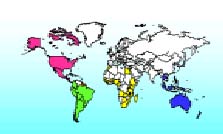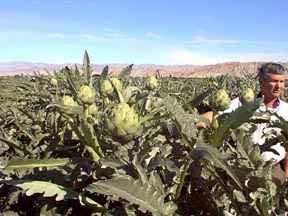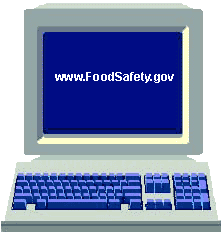|
Food Safety Outreach |
Training, Communication and Coordination, the World Over
FDA's food safety outreach programs extended to more than 30 countries in FY 2000. Exciting opportunities that presented themselves in that year included information exchanges with FDA's governmental counterparts in other nations and international food producers alike. The common thread: the universal goal of preventing foodborne illness.
Listed are just a few of the standout accomplishments:
- Teaching Good Agricultural Practices in Chile

A program in Chile in June 2000 trained some 50 representatives from the Chilean fresh produce industry, government and academia in produce safety, with an emphasis on good agricultural practices. The program, sponsored jointly by CFSAN, the Joint Institute for Food Safety and Applied Nutrition and the government of Chile, under the rubric of the United States-Chile Collaborative Exchange on Food Safety, consisted of a week of presentations by CFSAN representatives and their Chilean counterparts and also included tours of two fruit-packing facilities.
A separate seminar in Chile in the same month provided about 75 representatives
from government, industry and academia with a one-day overview of the U.S. National Food
Safety Initiative for consideration as a model for Chile.
As part of the seminar, U.S. representatives met with key Chilean officials to discuss
potential joint food safety projects.
- U.S. and Pacific Nations Share Food Safety Approaches
FDA co-hosted a regional outreach meeting in Auckland, New Zealand, in August 2000 with USDA and New Zealand's Ministry of Agriculture and Forestry (MAF) and Ministry of Health. The "Food Safety Initiatives Influencing Public Health and Trade" meeting, which included representatives from FDA, CDC and USDA, was part of FDA's series of "Road Shows," at which U.S. food safety officials explain the government's programs, policies and guidelines to representatives from countries interested in exporting food to the United States. In this case, the audience was made up of industry, university and government representatives from Australia, Indonesia, Malaysia, the Philippines, Thailand, Vietnam and 14 Pacific Islands.
"Our road shows are the purest form of outreach," says FDA's Camille Brewer, who co-chaired the meeting with Andrew McKenzie of New Zealand's MAF. "It's an opportunity for us to 'show and tell' what our expectations are of countries wanting to export food to the United States."
- U.S.-Mexico Collaboration in the Works
CFSAN staff met in February 2000 with six representatives from the Ministry of Agriculture, Livestock and Rural Development of Mexico (SAGAR) to discuss initiation of mutually beneficial food safety projects, including joint training activities.
That May, 74 representatives from SAGAR and other Mexican organizations interested in food safety participated in the first Mexico-U.S. Food Safety Research Conference, held in Mexico City. Senior scientists from FDA and USDA's Agricultural Research Service discussed with their Mexican counterparts the potential for developing mutually beneficial collaborative research projects on produce safety.
- Caribbean Food Safety Workshop
Representatives from FDA's Food Safety Initiative Staff and Office of International Programs participated in a March 2000 food safety meeting, the "Caribbean Food Safety Initiative Strategy Development Workshop," held in St. Lucia, West Indies. During the workshop, participants from the countries of the West Indies and some international agricultural and health organizations discussed food safety assessments that had previously been completed for 14 Caribbean countries and reviewed action plans to address recommended changes in food safety systems.
- International Dairy Safety Education
FDA's milk safety experts presented a dairy farm sanitation and milk safety course in August 2000 in San Salvador, El Salvador, to 60 representatives of government, industry, and academia from Central America (specifically, Costa Rica, El Salvador, Guatemala, Honduras, Nicaragua, and Panama) and the Dominican Republic. The course covered dairy farm sanitation and animal health topics, drug use and residue avoidance, water supplies, proper methods of sampling milk on the farm and cooling and transporting milk, inspection methods and recordkeeping. Presentations by representatives from the dairy industries in the Central American countries and the Dominican Republic dealt with the unique challenges presented by the tropical climate.
- Investigating an Outbreak: Government Officials Focus on Where the Farm Fits In

In a "Produce Farm Investigation" course held in California in May 2000, FDA, CDC and other government officials, in collaboration with the United Fresh Fruits and Vegetables Association, trained state and foreign regulatory officials in techniques for identifying potential sources of food contamination at the farm and how to properly apply good agricultural practices to consistently identify and assess issues encountered during a farm investigation. Six similar workshops are planned for FY 2001.
The four-day course, developed by FDA in consultation with state departments of agriculture and health, the University of California at Davis, and the produce industry, looked at the farm as it fits into a complete investigation into the causes for contaminated produce that leads to a foodborne outbreak.
Representatives of FDA and California, Texas, Florida, Michigan, Mexico and Canada participated in the course, which consisted of two days of classroom lectures and two days spent on-site, in fields, on farms and at packing houses, observing the growing and harvesting of fruits and vegetables.
Based on the course's success, the United Fresh Fruits and Vegetables Association
and several private consultants requested FDA's assistance in planning additional
training courses and workshops as part of
educational efforts to train stakeholders about
on-farm investigations.
- Cochran Fellowship Plans
FDA is planning to teach good agricultural practices to Central American countries in FY 2001 under an agreement reached with USDA's Foreign Agricultural Service (FAS) in FY 2000 to jointly fund the educational venture. The training will utilize the Cochran Fellowship Program funding made available by Congress since 1984 for training agriculturalists from middle income countries, emerging markets and emerging democracies.
- International Harmonization Steps
To promote development of harmonized standards for food safety, as well as food labeling, FDA in FY 2000 participated in the activities of more than 15 committees of the Codex Alimentarius Commission (Codex), a United Nations-based organization that develops international food safety standards.
For example, in FY 2000, the Codex Committee on Food Hygiene continued work on a code of hygienic practice for the production, harvesting and packaging of fresh fruits and vegetables and guidelines for the control of Listeria monocytogenes in ready-to-eat foods; the hygienic production of milk and egg products; and the overall management of microbial hazards in foods.
"By standardizing food production practices internationally," says H. Michael Wehr, who represents FDA on the Codex Committee on Food Hygiene, "Codex increases the level of safety of imported food products."
 www.FoodSafety.gov Whether you're an industry representative, health professional, consumer or educator, you'll find food safety information of interest to you at this federal gateway site. |



